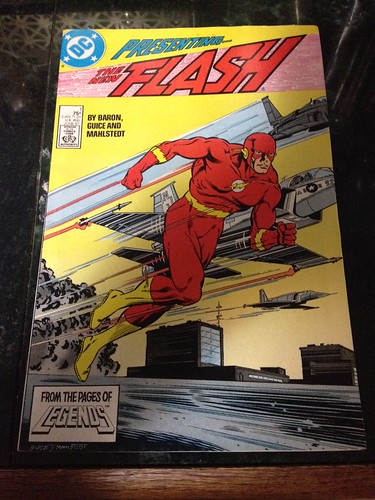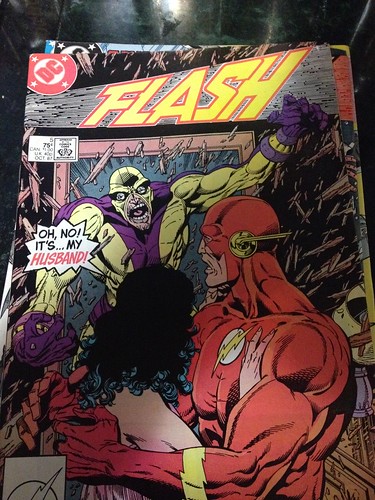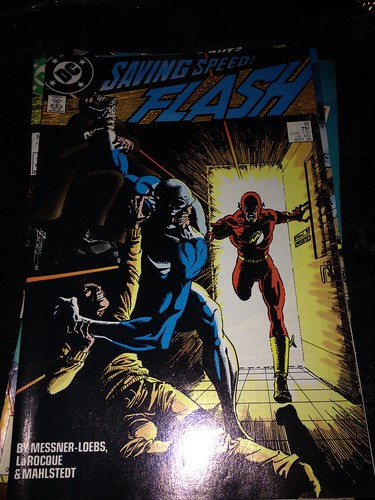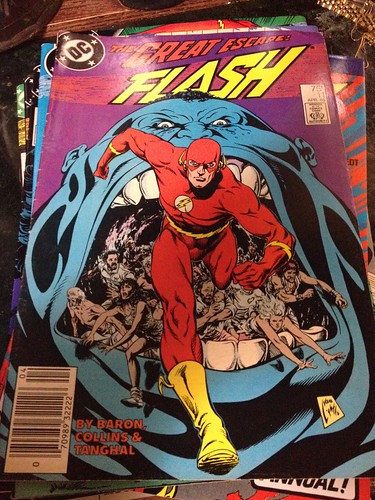The Red Menace Reads: The Flash
Long-time readers of this blog may remember that a little while back I wrote a little essay on my favorite superhero, The Flash. Specifically, Wally West, the third Flash. (I have not yet watched the new tv show, which is about the second Flash, Barry Allen. I'm sure I'll get around to it eventually, I just don't watch much tv in general.) My love of Wally, as I explain in more detail in the earlier piece, was formed from how he's portrayed in the Justice League cartoons and continued based on reading Geoff Johns' run on the comic, circa 2000. So it's a pretty modern, recent version of his character. 
My dear Mr. Menace has helped to round out the picture I have of Wally since then - he has been painstakingly assembling the entirety of The Flash, Volume 2, (Barry's adventures are Volume 1 - the first Flash, Jay Garrick, was in a title called "Flash Comics." Oh these subtle differences.) The series started in 1987, after the death of Barry Allen in Crisis on Infinite Earths. Up until that point, Wally had been Kid Flash, Barry's sidekick - the new series would explore him taking up the mantle of The Flash and what it truly meant. My run is complete up to #86, so I thought I'd do a periodic series on my reading - will it change how I see my favorite character, or will it make me love him all the more?
We'll start with the first two years, Flash #1-26, "Happy Birthday, Wally!" -"Beware the Porcupine Man!" Mike Baron wrote the first 14 storylines, with William Messner-Loebs taking over on Volume 15. One thing to note about superhero comics from this time period is that they're in this weird middle ground, storytelling-wise, between the one shot story lines of the early days of comics the long-form, tradepaperback-ready stories of today. Most of the plots in these 26 issues seem to run for about 2-3 issues, with some key points that carry through or are periodically revisited. That means a LOT happened in these 26 issues, but I'm not going to give a play-by-play; these are more my general impressions. If the public clamors for recaps, I'll consider it.
The story opens with Wally's 20th birthday party - quite fittingly, he's truly no longer a teen just in time for him to leave the Teen Titans and set off on his own as The Flash. From the beginning we see that Wally is struggling a bit - he hasn't been able to get up the speed he did before Barry died, and he's worried about money. Still, his friends are around him and he's ready for his new beginning. The birthday party doesn't last long, though, as Wally is asked to make an emergency cross-country delivery for a heart transplant, and along the way runs afoul of one of Barry's most dangerous enemies, Vandal Savage. Wally at the outset of the series is frankly a bit of a jerk - he has a chip on his shoulder about his former Kid Flash status. He's a lady-killer, going through countless flirtations and at least three serious girlfriends in these issues, including a protracted affair with an older, married woman named Tina McGee. (To be fair, her husband had turned himself into a steroid-fueled monster, and Wally seemed pretty torn about it at first.) Wally's even a bit of a misogynist - he seems to think that women are helpless and need to be cared for, even though many of the women in his life are quite capable (including Tina McGee, who is a scientist studying Wally's speed powers.) There were several times I wanted to reach into the book and smack him.  And yet - there are glimmers of the hero he'll eventually become. For one thing, the stories are told in such a way that it's clear that the writers are not condoning his bad behavior, nor do they seem to share his sentiments. They're showing us your average callous 20 year old if he'd also had unbelievable powers since he was just a kid. That's bound to affect anyone's judgment. Wally is also trying to make his way in the world in the absence of both his mentor, Barry, and his team - Wally was a founding member of the Teen Titans. Not only has he never really been on his own before, but he suddenly has to worry about things like money. Can he afford proper health care? What about liability insurance? And then, of course, there's his enormous appetite - Wally's powers come with a metabolic limitation, so his speed requires massive amounts of energy to maintain.
And yet - there are glimmers of the hero he'll eventually become. For one thing, the stories are told in such a way that it's clear that the writers are not condoning his bad behavior, nor do they seem to share his sentiments. They're showing us your average callous 20 year old if he'd also had unbelievable powers since he was just a kid. That's bound to affect anyone's judgment. Wally is also trying to make his way in the world in the absence of both his mentor, Barry, and his team - Wally was a founding member of the Teen Titans. Not only has he never really been on his own before, but he suddenly has to worry about things like money. Can he afford proper health care? What about liability insurance? And then, of course, there's his enormous appetite - Wally's powers come with a metabolic limitation, so his speed requires massive amounts of energy to maintain.  Glimpses of "my" Wally, as I think of him, are also present in how he treats the people in his life, especially his villains. For every careless moment or insensitive comment, there are plenty of moments that help you understand that underneath it all, Wally really wants to help people. I mentioned earlier that Tina McGee's husband had become a rage monster - well, Wally runs into Soviet Russia to extract the only man who can help him recover. Later, Wally meets The Chunk, a massive misfit with a literal black hole inside of him. Wally helps him learn to use those powers for good and even becomes friends with him - they bond over the immense quantities of food they both need to consume.
Glimpses of "my" Wally, as I think of him, are also present in how he treats the people in his life, especially his villains. For every careless moment or insensitive comment, there are plenty of moments that help you understand that underneath it all, Wally really wants to help people. I mentioned earlier that Tina McGee's husband had become a rage monster - well, Wally runs into Soviet Russia to extract the only man who can help him recover. Later, Wally meets The Chunk, a massive misfit with a literal black hole inside of him. Wally helps him learn to use those powers for good and even becomes friends with him - they bond over the immense quantities of food they both need to consume.  In a way, the fact that he's sometimes a pill makes me love Wally all the more. He's a real person who makes mistakes, despite his powers. In true 80's fashion, these lessons are sometimes a bit heavy-handed - the issue where he learns that anyone can become homeless - even heroes! - was a bit eye-roll inducing for sure (plus it turned out that Wally's financial woes were alien-induced, and led him to meeting Fidel Castro in Cuba. O-KAY). There's also timely mentions of drug use, "yuppie flu," and some terrible clothes. But there's a heart there, the core of the Wally I love.
In a way, the fact that he's sometimes a pill makes me love Wally all the more. He's a real person who makes mistakes, despite his powers. In true 80's fashion, these lessons are sometimes a bit heavy-handed - the issue where he learns that anyone can become homeless - even heroes! - was a bit eye-roll inducing for sure (plus it turned out that Wally's financial woes were alien-induced, and led him to meeting Fidel Castro in Cuba. O-KAY). There's also timely mentions of drug use, "yuppie flu," and some terrible clothes. But there's a heart there, the core of the Wally I love.  Overall, the series is off to a good start, and I'm looking forward to seeing how Wally progresses in the next set of issues. As a fun lady bonus, a good chunk of this run was edited by Barbara Kesel, who broke into comics by writing a letter to Dick Giordano, DC's editor in chief at the time, about the portrayal of women in comics. So change can happen!
Overall, the series is off to a good start, and I'm looking forward to seeing how Wally progresses in the next set of issues. As a fun lady bonus, a good chunk of this run was edited by Barbara Kesel, who broke into comics by writing a letter to Dick Giordano, DC's editor in chief at the time, about the portrayal of women in comics. So change can happen!
Have you ever done a deep dive or gone all the way back to the beginning on a character or title you love? What happened as a result?
